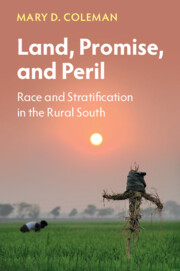Book contents
- Land, Promise, and Peril
- Cambridge Studies in Stratification Economics: Economics and Social Identity
- Land, Promise, and Peril
- Copyright page
- Contents
- Figures
- Tables
- Preface
- Acknowledgments
- Part I The Family in an Intemperate Community, State, and Nation
- Part II Family Interiority and Economic Mobility Pathways
- 7 Perennial Sharecroppers
- 8 Quasi-Croppers and Family Interiority
- 9 The Mule-Renter’s Son
- 10 The Byrd Farmers
- 11 Contemporaries of the Second Sunflower Generation
- 12 Central Hills Family and Place in Struggle
- Part III Pathways toward Upward Economic Mobility
- Select Bibliography
- Index
8 - Quasi-Croppers and Family Interiority
from Part II - Family Interiority and Economic Mobility Pathways
Published online by Cambridge University Press: 15 April 2023
- Land, Promise, and Peril
- Cambridge Studies in Stratification Economics: Economics and Social Identity
- Land, Promise, and Peril
- Copyright page
- Contents
- Figures
- Tables
- Preface
- Acknowledgments
- Part I The Family in an Intemperate Community, State, and Nation
- Part II Family Interiority and Economic Mobility Pathways
- 7 Perennial Sharecroppers
- 8 Quasi-Croppers and Family Interiority
- 9 The Mule-Renter’s Son
- 10 The Byrd Farmers
- 11 Contemporaries of the Second Sunflower Generation
- 12 Central Hills Family and Place in Struggle
- Part III Pathways toward Upward Economic Mobility
- Select Bibliography
- Index
Summary
The Mississippi Delta lost a lot of its population during the 1920s, and many farms went into foreclosure. Jack and Hattie’s parents and Lonnie’s father held on to their land during this period. Agnes and Josie managed their misery. David Williams stopped out of school and found work with fringe benefits. Before eventually heading to the military, Matthews stayed in school and helped his parents in the fields. If Agnes and Josephine’s births were punctuated by the founding work of the NAACP and by growing anti-immigration sentiments in US policy, then Clementine Richardson’s birth year was ominous. Clementine was born in the Stephenville Community on Britts Plantation in the year of the Great Depression in 1932. Her mother, Mrs. Matilda Richardson, received a 6th-grade education; her father, Peter Richardson, could neither read nor write. The twelve children were in the Richardson household; two were from previous unions. The average household African American income in 1935 was $330 a year, while for whites it was $1,220.
- Type
- Chapter
- Information
- Land, Promise, and PerilRace and Stratification in the Rural South, pp. 169 - 185Publisher: Cambridge University PressPrint publication year: 2023

